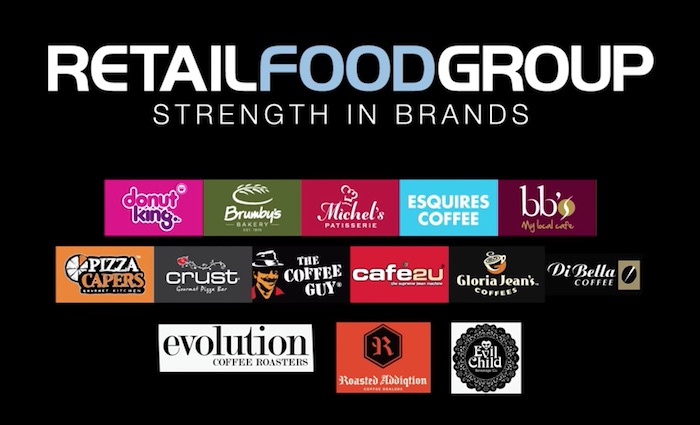A tasty choice: The contrarian case for Retail Food Group
As a high conviction, deep value investor, I like investing in businesses that can be bought cheaply, are easy to understand and have an obvious catalyst for a profitable re-rating of the stock price. Unfortunately, with interest rates at historic lows and the ASX at historic highs, there aren’t many opportunities that meet all of my criteria.
One ‘out of the box’ idea that I have taken a substantial position in over the last few months is Retail Food Group (RFG.ASX), owner of well-known food brands such as Pizza Capers, Donut King and Gloria Jeans, among others.
This is a company that due to historical factors has left a bad taste in the mouth of many investors, having fallen from a high of $7.50 in 2015 to around 7 cents today. Regulatory action being undertaken by the ACCC based on the historical treatment of franchisees and the closure of many shopping centres around the country throughout the COVID-19 pandemic haven’t helped matters either.
.jpg)
So why invest?
At Collins St Asset Management we believe that there are three compelling reasons underpinning our investment thesis:
1. The stock is objectively cheap
Following a $190M capital raising in late 2019 (at a discount of over 40% to the share price at the time) the company has been able to reduce debt from $260M to $54M and, based on an earnings per share of 1 cent, bring its interest coverage ratio up to an incredible 22 times.
Earnings of 1 cent per share can be cheaply bought based on the 7 cent share price (P/E of 7) and look very favourably priced against other broadly comparable companies such as Dominos (50X), Collins Food Group (27X) and, to an extent, Metcash (15X).
Based on the fundamentals of the business (and some strategic initiatives that I’ll expand on below) I believe that earnings per share can grow at a rate of around 15% p.a. moving forward with the potential for an 8% grossed-up dividend yield this financial year, an obvious catalyst for a re-rating for the stock if ever there was one!
2. The new management team are driving improved franchisee relations underpinned by an investment in technology
Culture trumps strategy. For a long time, it was questionable if Retail Food Group were getting either right, but under the relatively new leadership of Peter George, positive, tangible changes have been made.
Firstly, the business has been fundamentally reshaped. From a peak of 2,516 stores across all networks in the 2017 financial year, Retail Financial Group is now a lot leaner and more focused with a store count of 850. This is important because (and excuse the cheesy puns) the relentless growth pursued by the previous management teams saw far too many franchisees getting burned. Growth needs to be measured, sustainable and done in a way where all stakeholders get a fair slice of the financial pie.
Secondly, management has been investing in innovation and have been resilient in the face of large scale shopping centre closures throughout COVID 19. A classic example of this is the way in which Gloria Jeans pioneered drive-through coffee purchases at a time when cafes were under forced closure. This strategy saw same-store sales actually increase by nearly 20% - offsetting the declining figures from those cafes that weren’t able to serve as many customers as usual due to social distancing requirements.
Social media advertising and a refreshed focus on product development across the suite of brands will also drive revenue growth and act as another proof point of the collaborative relationship being built between RFG and the franchisee network.
Thirdly, the company is undergoing a rebranding strategy away from the Retail Food Group name, back to its origins as Iconic Co. This may seem like a minor point, but perception is reality and the more distance that is created between the business past and its future the more investors will actually focus on what lies ahead.
After all, Australian’s love of a good pizza or a doughnut hasn’t changed over the last five years – it’s the investors who need convincing!

3. Any news will be good news
Following on from the point above, separation from the past is key for RFG. This also applies to the ACCC regulatory action being taken against the company. Whilst the new management team are defending the action as it stands, they have made a genuine commitment to right the wrongs of the past and it is my view that any news will be good news in terms of settlement figures/timing. In much the same way as other unloved stocks such as Cash Converters were able to rally strongly at the conclusion of historical legal proceedings (even with the settlement amount being above what had been forecast at the time) so to should RFG. Importantly, management will then be able to double down on their focus for future, sustainable growth and deliver the financial outcomes we believe are nowhere near baked into the current share price.
Closing thoughts
Whilst management has a big task ahead of them, fast forward 12 – 18 months and we see the share price sitting around 15 cents, more than double what it is now. We also see a clear path towards dividends starting back up and a refreshed, rebranded entity being judged objectively for what it actually is, not what it once was.
For some, this may be a difficult story to believe, particularly those who have been on the journey with RFG for some time, but the key ingredient in successful value investing is "being comfortable feeling uncomfortable". After all, to get earn what others don’t you have to be prepared to invest where others won’t!
If we don't love it, we don't buy it
Retail Food Group (RFG) is one of our high-conviction holdings in the Collins St Value Fund. To find out more on our firm's philosophy, performance history and current sector positioning, watch the CSVF Fund in Focus here.
1 stock mentioned

